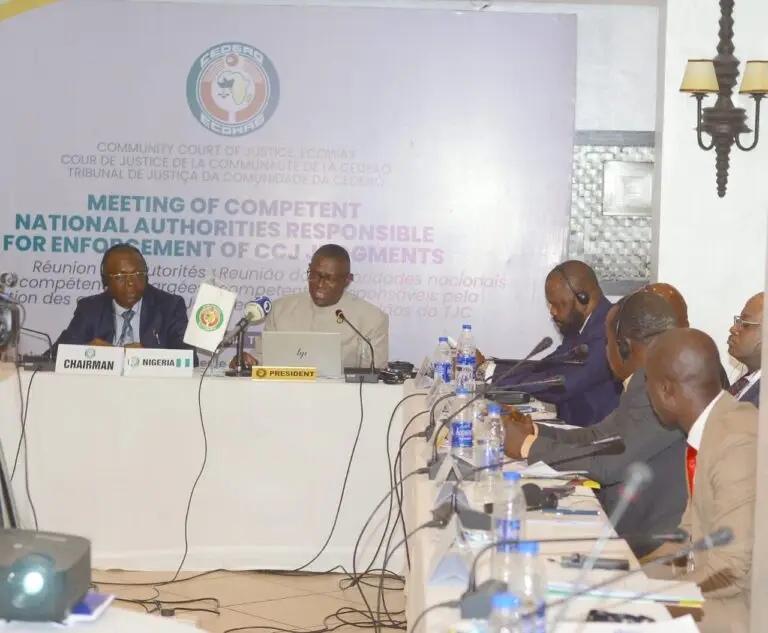ECOWAS court unveils strategies for stronger judgment enforcement
Enforcement
By Taiye Olayemi
The ECOWAS Court has outlined key strategies aimed at strengthening the enforcement of its judgments across member states.
Mr Gaye Sowe, Acting Deputy Chief Registrar of the ECOWAS Court, disclosed this during a news conference at the close of the two-day inaugural meeting of Competent National Authorities of ECOWAS member states, held in Lagos.
The theme of the meeting was “Enhancing the Role, Relevance, and Effectiveness of the ECOWAS Court of Justice: Strengthening Synergies Between the Court and Competent National Authorities”.
Sowe, who also serves as the Registrar in charge of Appeals, Arbitration, and Enforcement at the ECOWAS Court, stated that the meeting had provided a platform for discussions and practical proposals to address long-standing enforcement challenges.
He said that the meeting agreed on bridging the existing communication gap between the Court and national authorities to foster judgment compliance.
He noted that this became necessary following observations that frequent changes in public office holders had led to communication breakdowns between the Court and national authorities.
He explained that direct engagement with national officials was critical to resolving enforcement bottlenecks, particularly as not all member states had designated the required Competent Authorities to receive and implement the Court’s judgments.
He said that the Court also reached a consensus on developing clear guidelines for the award of reparations and ensuring in-person engagement with Competent National Authorities.
He explained that it was also agreed that the Court would focus on fostering working and lasting relationships with stakeholders across member states.
“These strategies are designed to make the Court’s judgments more impactful and enforceable by improving understanding, coordination, and cooperation between the Court and the designated authorities in each country.
“The challenge of enforcement has persisted for years. What this meeting has done is to provide a platform for legal and technical experts to brainstorm and propose practical solutions,” he added.
Speaking on the Court’s progress, Sowe noted that since the amendment of the Court’s Protocol in 2005, the Court had presided over 400 cases across member states.
He said that 125 of such cases were from Nigeria, out of which 10 judgments had been enforced, 50 were not yet enforced, and 65 were dismissed.
Earlier, the President of the ECOWAS Court, Justice Ricardo Gonçalves, said the domestication of the Revised Treaty and the Court’s Protocols remains a critical issue.
He noted that without incorporation into national law, especially in dualist common law countries, the enforcement of the Court’s judgments is greatly limited.
He, however, urged member states to expedite the process to ensure smooth implementation and uphold the Court’s authority.
“Through your candid contributions, we have identified actionable pathways to enhance adherence to the Court’s decisions, ensure consistency in enforcement procedures, equip national authorities with the requisite technical and procedural tools, and build a framework for ongoing collaboration.
“This meeting has fostered a deeper understanding of the obstacles we face and has enabled the sharing of best practices and practical solutions.
“Crucially, it has strengthened the bonds of cooperation between the Court and national authorities, ensuring that our judgments are not merely symbolic, but are effectively translated into real and lasting justice for the peoples of our region.
“I am confident that the knowledge shared and the commitments made during this meeting have sensitized all participants to the legal frameworks, roles, and obligations that underpin the enforcement of the Court’s decisions,” he said. (NAN) (www.nannews.ng)
Edited by Olawunmi Ashafa





